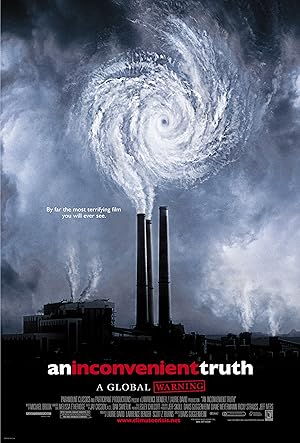
An Inconvenient Truth Page #5
in the Arctic,
the Ward Hunt Ice Shelf.
It just cracked in half three years ago.
The scientists were astonished.
These are called drunken trees
This is not caused by wind damage
or alcohol consumption.
These trees put their roots down
in the permafrost,
and the permafrost is thawing.
And so they just go
every which way now.
This building was built
on the permafrost
and has collapsed
as the permafrost thaws.
This woman's house has had
to be abandoned.
The pipeline is suffering
a great deal of structural damage.
And incidentally, the oil that they want
to produce in that protected area
in Northern Alaska,
which I hope they don't,
they have to depend on trucks
to go in and out of there.
And the trucks go over
the frozen ground.
Thirty-five years ago, 225 days a year.
Now it's below 75 days a year
because the spring comes earlier
and the fall comes later
and the temperatures
just keep on going up.
I went up to the North Pole.
I went under that ice cap
in a nuclear submarine
that surfaced through the ice like this.
Since they started patrolling in 1957,
they have gone under the ice
and measured
with their radar looking upwards
because they can only surface in areas
where it's three and a half feet thick
or less.
So they have kept a meticulous record
and they wouldn't release it
because it was national security.
I went up there in order to persuade
them to release it, and they did.
And here's what that record shows.
Starting in 1970,
there was a precipitous drop-off
in the amount and extent and thickness
of the Arctic ice cap.
It has diminished by 40% in 40 years.
And there are now
that within the next 50 to 70 years,
in summertime
it will be completely gone.
Now, you might say,
"Why is that a problem?"
And "How could the Arctic ice cap
actually melt so quickly?"
When the sun's rays hit the ice,
more than 90% of it bounces off
right back into space like a mirror.
But when it hits the open ocean,
more than 90% of it is absorbed.
And so, as the surrounding water
gets warmer,
it speeds up the melting of the ice.
Right now, the Arctic ice cap acts
like a giant mirror.
All the sun's rays bounce off,
more than 90%.
But as it melts
and the open ocean receives
that sun's energy instead,
more than 90% is absorbed.
So there is
a faster buildup of heat here,
at the North Pole, in the Arctic Ocean,
and the Arctic generally
than anywhere else on the planet.
That's not good for creatures like
polar bears who depend on the ice.
A new scientific study shows that
for the first time they're finding
polar bears that have actually drowned,
swimming long distances,
up to 60 miles, to find the ice.
And they didn't find that before.
But what does it mean to us?
To look at a vast expanse of open water
at the top of our world
that used to be covered by ice.
We ought to care a lot
because it has planetary effects.
The Earth's climate is like a big engine
for redistributing heat
from the equator to the poles.
And it does that by means
of ocean currents and wind currents.
They tell us, the scientists do, that the
Earth's climate is a nonlinear system.
Just a fancy way they have of saying
that the changes are not
all just gradual.
Some of them come suddenly,
in big jumps.
On a worldwide basis,
the annual average temperature is
about 58 degrees Fahrenheit.
If we have an increase of five degrees,
which is on the low end
of the projections,
look at how that translates globally.
That means an increase of only
one degree at the equator,
but more than 12 degrees at the pole.
And so all those wind
that have formed since the last ice age
and have been relatively stable,
they're all up in the air and they change.
And one of the ones
they're most worried about,
where they've spent a lot of time
studying the problem,
is in the North Atlantic
where the Gulf Stream comes up
and meets the cold winds
coming off the Arctic over Greenland.
And that evaporates so that the heat
out of the Gulf Stream
to Western Europe
by the prevailing winds
and the Earth's rotation.
But isn't it interesting that
the whole ocean current system
is all linked together in this loop?
They call it the ocean conveyor.
And the red are
the warm surface currents.
The Gulf Stream is
the best known of them.
But the blue represent the cold currents
running in the opposite direction,
and we don't see them at all because
they run along the bottom of the ocean.
Up in the North Atlantic,
after that heat is pulled out,
what's left behind is
colder water and saltier water
because the salt doesn't go anywhere.
And so that makes it
denser and heavier.
And so that cold, dense,
heavy water sinks
at the rate of five billion
gallons per second.
And then that pulls that current
back south.
At the end of the last ice age,
as the last glacier was receding
from North America,
as the last glacier was receding
from North America,
the ice melted
and a giant pool of fresh water
formed in North America.
And the Great Lakes are the remnants
of that huge lake.
An ice dam on the eastern border
formed and one day it broke.
And all that fresh water
came rushing out,
ripping open the St. Lawrence there,
and it diluted the salty, dense,
cold water,
made it fresher and lighter,
so it stopped sinking.
And that pump shut off.
And the heat transfer stopped.
And Europe went back into an ice age
for another 900 to 1,000 years.
And the change from conditions
like we have here today
to an ice age
took place in perhaps
as little as 10 years' time.
So that's a sudden jump.
Now, of course that's
because the glaciers of North America
are not there, and...
Is there any other big chunk of ice
anywhere near there?
Oh, yeah.
We'll come back to that one.
It's extremely frustrating to me
to communicate over and over again,
as clearly as I can.
And we are still, by far,
the worst contributor to the problem.
And I look around
and look for really meaningful signs
that we're about to really change.
I don't see it right now.
A number of very reputable scientists
have said that one factor of air pollution
is oxides of nitrogen
from decaying vegetation.
This is what causes the haze that gave
the big Smoky Mountains their name.
Thank you very much, okay.
This guy is so far off
in the environmental extreme,
we'll be up to our neck in owls
and out of work for every American.
This guy is crazy.
Even if humans were causing
global warming, and we are not,
this could be maybe the greatest hoax
ever perpetrated
on the American people.
We're dealing with something
that's highly emotional.
If an issue is not
Translation
Translate and read this script in other languages:
Select another language:
- - Select -
- 简体中文 (Chinese - Simplified)
- 繁體中文 (Chinese - Traditional)
- Español (Spanish)
- Esperanto (Esperanto)
- 日本語 (Japanese)
- Português (Portuguese)
- Deutsch (German)
- العربية (Arabic)
- Français (French)
- Русский (Russian)
- ಕನ್ನಡ (Kannada)
- 한국어 (Korean)
- עברית (Hebrew)
- Gaeilge (Irish)
- Українська (Ukrainian)
- اردو (Urdu)
- Magyar (Hungarian)
- मानक हिन्दी (Hindi)
- Indonesia (Indonesian)
- Italiano (Italian)
- தமிழ் (Tamil)
- Türkçe (Turkish)
- తెలుగు (Telugu)
- ภาษาไทย (Thai)
- Tiếng Việt (Vietnamese)
- Čeština (Czech)
- Polski (Polish)
- Bahasa Indonesia (Indonesian)
- Românește (Romanian)
- Nederlands (Dutch)
- Ελληνικά (Greek)
- Latinum (Latin)
- Svenska (Swedish)
- Dansk (Danish)
- Suomi (Finnish)
- فارسی (Persian)
- ייִדיש (Yiddish)
- հայերեն (Armenian)
- Norsk (Norwegian)
- English (English)
Citation
Use the citation below to add this screenplay to your bibliography:
Style:MLAChicagoAPA
"An Inconvenient Truth" Scripts.com. STANDS4 LLC, 2025. Web. 23 Feb. 2025. <https://www.scripts.com/script/an_inconvenient_truth_2787>.







Discuss this script with the community:
Report Comment
We're doing our best to make sure our content is useful, accurate and safe.
If by any chance you spot an inappropriate comment while navigating through our website please use this form to let us know, and we'll take care of it shortly.
Attachment
You need to be logged in to favorite.
Log In